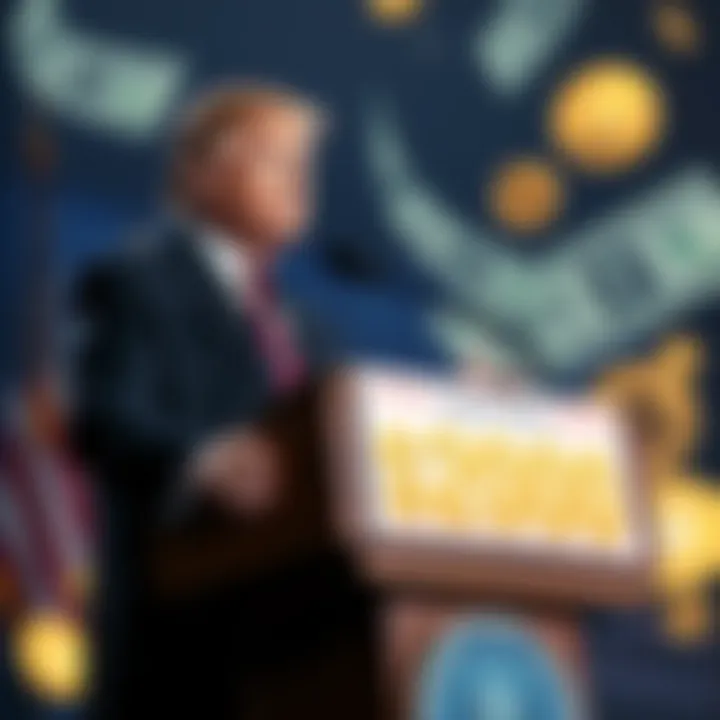Trump Announces $2,000 Tariff Checks | What It Means for Crypto
Edited By
Lina Zhang

On November 9, 2025, President Donald Trump stirred controversy by posting on Truth Social about a proposed $2,000 dividend check for most Americans, funded through tariff revenue. This could act as a new stimulus check but faces legal challenges that may hinder its implementation.
Proposal Under Fire
While the idea of giving out checks to average Americans might sound appealing, the Supreme Court is currently deliberating on the legality of Trump's emergency tariff program. Prediction markets place the chances of the tariffs being approved at a low 20%, raising skepticism about the proposal's viability.
Context Matters
Analysts from The Kobeissi Letter suggest that if the checks go through, about 85% of U.S. adults could benefit, echoing patterns seen during earlier stimulus distributions amid the COVID-19 pandemic. Historically, 11% of younger Americans invested part of their COVID checks into cryptocurrency, raising expectations for a similar surge if funds are released.
"Stocks and Bitcoin usually rise when new stimulus money shows up," noted crypto advocate Anthony Pompliano.
Inflation Concerns
However, this potential influx of cash comes with strings attached. Additional stimulus could fuel inflation, eroding purchasing power over time. Some analysts worry that unless individuals invest these checks, their value might diminish. Simon Dixon, a Bitcoin proponent, stresses that failing to put such funds into assets can result in lost value due to inflation and interest payments.
Mixed Reactions from the Public
Comments surrounding Trump's announcement reflect a range of opinions from skepticism to hope. Many express doubt regarding the feasibility of such a plan, with remarks including:
"Not gonna happen, don’t fall for that."
"He’s just trying to buy midterm votes."
"The concept of an idea"
Some see the proposal as a strategic move, likening it to a form of socialism in a traditionally conservative administration. As one commenter quipped, "Republicans implementing a shred of socialism before dems is peak America."
Key Insights
△ $2,000 checks might hit about 85% of U.S. adults if legal hurdles are cleared.
▽ Current odds of the Supreme Court upholding the tariffs sit in the low 20% range.
※ "If you do not put that money into assets, it will just be inflated away,” emphasizes Simon Dixon.
Closure
In summary, Trump's proposed tariff checks represent both a potential lifeline for many Americans and a risk in exacerbating existing inflation concerns. As this story develops, the crypto market awaits the implications of any financial windfall should the proposal succeed.
What Lies Ahead for Tariff Checks and Crypto
As the Supreme Court weighs the legality of Trump's tariff dividend checks, there's a strong chance the proposal could face prolonged scrutiny. Analysts suggest that if the court ultimately approves the program, approximately 85% of U.S. adults might receive $2,000 each. However, with current predictions estimating just a 20% chance of the tariffs being upheld, the rollout may not happen as quickly as hoped. Should the checks become reality, experts speculate a surge of interest in cryptocurrency investments similar to the COVID relief checks, potentially driving Bitcoin and other digital assets higher as people look for ways to protect their purchasing power amid rising inflation concerns.
Historical Echoes in Economic Response
A less obvious but intriguing parallel can be drawn to the era following World War II when the U.S. government offered various financial incentives to stimulate economic growth. Much like today's proposed tariff checks, those incentives were met with both enthusiasm and skepticism. At the time, many Americans used funds to invest in a burgeoning automobile industry rather than saving them or spending them on immediate needs. Similarly, today's checks could push a wave of investment into cryptocurrencies, much like how post-war America transformed its economy by embracing new technologies. This historical lens suggests that while immediate consumer spending might be uncertain, significant shifts in investment behavior could emerge, paving the way for long-term industry growth.
